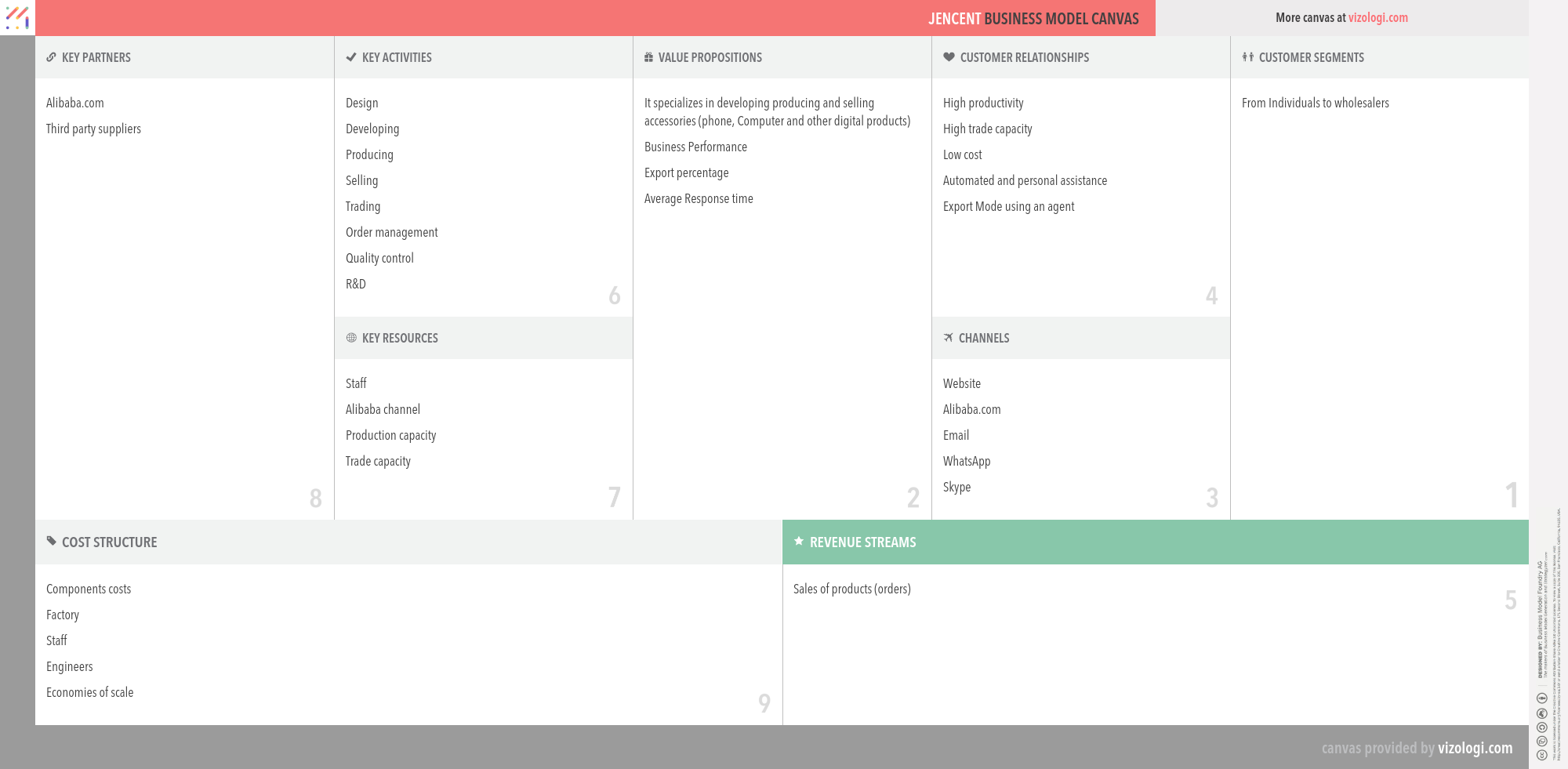Why Jencent's Business Model is so successful?
Get all the answers 
Jencent’s Company Overview
Jencent Electronics Technology Ltd. specializes in developing, producing and selling accessories for phone, computer and other digital products. They have over 500 models for you to choose from. And their clients in the EU and the US are satisfied with their CE, FCC and Rosh-marked products.
http://www.jencent.comCountry: Guangdong
Foundations date: 2000
Type: Private
Sector: Industrials
Categories: Electronics
Jencent’s Customer Needs
Social impact:
Life changing:
Emotional: design/aesthetics, provides access
Functional: simplifies, reduces cost, integrates, variety
Jencent’s Related Competitors
Jencent’s Business Operations
Demand then made:
Early applications in distribution, production, and buying combined to form the supply chain. However, due to investments in information technology, cost analysis, and process analysis, traditional supply networks have been converted into quicker, cheaper, and more dependable contemporary supply chains. The second side of the value chain is marketing, sales, and service, which generate and maintain demand and are referred to as the market then made.
Direct selling:
Direct selling refers to a situation in which a company's goods are immediately accessible from the manufacturer or service provider rather than via intermediate channels. The business avoids the retail margin and any extra expenses connected with the intermediaries in this manner. These savings may be passed on to the client, establishing a consistent sales experience. Furthermore, such intimate touch may help to strengthen client connections. Finally, direct selling benefits consumers by providing convenience and service, such as personal demonstrations and explanations of goods, home delivery, and substantial satisfaction guarantees.
Dynamic pricing:
This pattern allows the business to adjust its rates in response to national or regional trends. Dynamic pricing is a pricing technique known as surge pricing, demand pricing, or time-based pricing. In which companies establish variable prices for their goods or services in response to changing market conditions. Companies may adjust their rates based on algorithms that consider rival pricing, supply and demand, and other market variables. Dynamic pricing is widely used in various sectors, including hospitality, travel, entertainment, retail, energy, and public transportation.
eCommerce:
Electronic commerce, or e-commerce (alternatively spelled eCommerce), is a business model, or a subset of a larger business model, that allows a company or person to do business via an electronic network, usually the internet. As a result, customers gain from increased accessibility and convenience, while the business benefits from integrating sales and distribution with other internal operations. Electronic commerce is prevalent throughout all four main market segments: business to business, business to consumer, consumer to consumer, and consumer to business. Ecommerce may be used to sell almost any goods or service, from books and music to financial services and airline tickets.
Make more of It:
The business invests time and money in developing in-house expertise and development that may be used both internally and outside to sell goods or services to clients or third parties. AWS was created to meet Amazon's cloud computing requirements. They quickly discovered that they could offer their services to end-users. At the moment, AWS accounts for about 11% of Amazon's overall income.
Mass customization:
Mass customization is a strategy that entails using modular goods and manufacturing processes to allow efficient product individualization. Mass customization refers to producing customized output using flexible computer-aided manufacturing systems in marketing, manufacturing, contact centers, and management. Mass customization is the next frontier for manufacturing and service sectors alike. Beyond the physical product, mass customization is utilized by a diverse variety of software products and services with the goal of developing strong connections with customers via personalization and suggestion.
Niche retail:
A marketing strategy for a product or service includes characteristics that appeal to a particular minority market segment. A typical niche product will be distinguishable from other goods and manufactured and sold for specialized purposes within its associated niche market. Niche retail has focused on direct-to-consumer and direct-to-business internet sales channels. The slogan for niche retail is Everything except the brand.
Reverse engineering:
It is a legally sanctioned technique of duplicating a technology in which, rather than beginning from scratch, one starts with an existing product and works backward to determine how it works. Once the product's basic principle or core idea is established, the next stage is to replicate the same outcomes using other methods to prevent (legally prohibited) patent infringement. The cost of manufacturing is significantly lowered.
Solution provider:
A solution provider consolidates all goods and services in a particular domain into a single point of contact. As a result, the client is supplied with a unique know-how to improve efficiency and performance. As a Solution Provider, a business may avoid revenue loss by broadening the scope of the service it offers, which adds value to the product. Additionally, close client interaction enables a better understanding of the customer's habits and requirements, enhancing goods and services.
User design:
A client is both the manufacturer and the consumer in user manufacturing. For instance, an online platform could offer the client the tools required to create and market the product, such as product design software, manufacturing services, or an online store to sell the goods. In addition, numerous software solutions enable users to create and customize their products to respond to changing consumer requirements seamlessly.
White label:
The term white label refers to a product or service bought by a reseller who rebrands it to show that the new owner developed it. Frequently, white-label goods are mass manufactured. Thus, white-label goods are produced by one firm and sold by another under their brand and model number. For instance, most Dell computer screens are created by third-party manufacturers yet have the Dell brand and model number.
Recommended companies based on your search:

